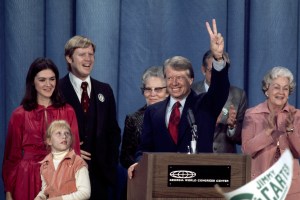How John Belushi, Hunter S. Thompson, More Chronicled Jimmy Carter’s Rise and Legacy
Remembering Carter
The 39th president’s one-term was complicated, but the years following left an indelible mark for the good
Former President Jimmy Carter died at the age of 100 on Sunday, Dec. 29. He spent his final days in hospice care at home in Plains, Georgia in the modest house he and his wife of 77 years, Rosalynn, owned since 1961. It was also the town where Carter was born and raised. Rosalynn died on Nov. 19, 2023 at age 96 also in the home they shared.
The Southern peanut farmer-turned-politician was not favored to win the presidency, as Hunter S. Thompson illustrated in his short novel-length campaign trail diatribe. So, when Carter unexpectedly became commander in chief in 1976 — narrowly beating out Republican incumbent Gerald Ford — he drew much curiosity as Rolling Stone’s intrepid reporters on the victory event Dan Aykroyd and John Belushi tangentially covered.
As the 39th president, Carter only served for one term — and it was rife with challenges, from the energy crisis to myriad economic issues and it ended with the Iran hostage crisis. While he may not go down as the most lauded president in the annals of history, his diplomatic and humanitarian pursuits post-presidency proved exceptional, notably establishing the Carter Center and Habitat for Humanity, and led to him winning the Nobel Peace Prize in 2002. Being more of a Washington outsider, Carter had no qualms calling out corruption in recent years, and his downhome style fostered connections to the rock world no other leader had previously had.
Following is a list of some of the stories he inspired in Rolling Stone.
-
Dan Aykroyd, John Belushi Road Trip to Carter’s Victory Event
Image Credit: Bettmann Archive/Getty Images Three years before Dan Aykroyd and John Belushi would star in classic film, The Blues Brothers, the two original castmates from Saturday Night Live were “two budding journalists” on assignment for Rolling Stone. Their mission is framed around covering Jimmy Carter’s 1977 event celebrating his presidential win in Atlanta, Georgia at the Georgia World Congress Center at the Omni complex, but it’s more about their journey and a snapshot of the times and the “New South” than insight into upcoming policies and the then-president’s victory. To wit, after Aykroyd engages a masked man at the event to ask how he voted, the man complains about what’s being shown on TV. “I think that about sums up the feeling of the American people here tonight. No one… really … gives … that much … of a shit. Thank you,” Aykroyd quips. While they don’t meet the president, they do meet with his son Jack, and interview a cast of interesting characters at the event and in other cities they venture to on the trip. — Athlea Legaspi
-
Jimmy Carter: Music Man
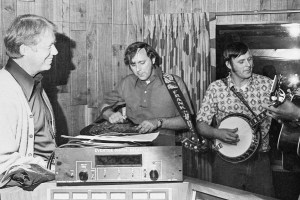
Image Credit: Getty Images As governor of Georgia, Carter would champion stringent anti-piracy legislation to combat bootlegging. This, reportedly, played no role in Capricorn Records founder Phil Walden’s decision to throw his prodigious weight behind Carter during his presidential run, resulting in bands like the Allmans, the Charlie Daniels Band, and the Marshall Tucker Band stumping for him in 1975 (at least one of these artists didn’t seem particularly invested in Carter either way, with Doug Gray, the lead singer of the Marshall Tucker Band, telling RS’ Art Harris, “I don’t know why we like Jimmy Carter. There’s nothing outstanding about him and I personally don’t know the man”). The relationship between Walden and Carter helped spark Carter’s later legacy as a Southern rock-loving politician, which would be chronicled in the 2017 documentary Jimmy Carter: Rock & Roll President. — E.J. Dickson
-
Looking For the American Dream in Iowa
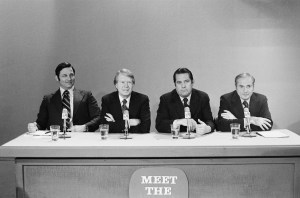
Image Credit: NBC/NBCU Photo Bank/Getty Images Joe Klein’s classic dispatch from Sioux City, Iowa, where the 1976 presidential election that Carter ultimately won kicked off, provides a snapshot in time of a fractured post-Vietnam War political landscape riddled with ambivalence and lack of trust in the establishment. “It used to be that a politician could promise something that was meaningful to most people, like a chicken in every pot. Everybody wanted and needed the same things. Nowadays it’s difficult to find two people who want the same thing,” one local politician aptly sums up, concluding, “I think we’ve lost the American Dream.” Carter started out in the state as a virtual unknown, campaigning as a simple peanut farmer from Georgia, his fundamentalist religious sister Ruth (who famously briefly befriended and tried to convert Larry Flynt) attempting to capture the hearts of evangelical groups in the state — but his performance in Iowa ultimately catapulted him to national recognition. — E.J.D.
-
Jimmy Carter’s Law Day Speech
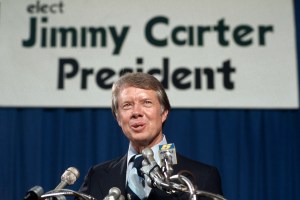
Image Credit: Bettmann Archive/Getty Images In his typical Gonzo journalism style, Hunter S. Thompson chronicles the chaotic and historical 1976 presidential election campaign trail, and how Thompson himself helped catapult Jimmy Carter as a worthy presidential candidate. Back in 1974, at a Georgia Law Day luncheon, Thompson was in a drunken haze when Carter delivered a speech so powerful, Thompson put down his bottle of Wild Turkey and picked up his tape recorder to capture the “oratorical artwork.” In the speech, Carter not only firmly challenged the Southern legal system, he also called Bob Dylan one of his top advisors. Thompson was transfixed by the then-Georgia governor and let it be known, writing “I have never heard a sustained piece of political oratory that impressed me any more than the speech Jimmy Carter made on that Saturday afternoon in May 1974.” Thompson’s unapologetic endorsement for Jimmy Carter was published just a month before Carter clinched the Democratic nomination. — Maya Georgi
-
Jimmy Carter and Foreign Policy
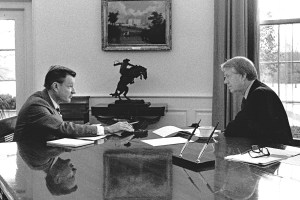
Image Credit: White House/CNP/Getty Images Over the course of his administration, Carter had a handful of foreign policy coups, most famously the signing of the Camp David accords in 1979, or the negotiation of a peace agreement between Egypt’s Anwar Sadat and Israel’s prime minister Menachem Begin. In this 1977 piece by activist Tom Hayden, however, Hayden waxes pessimistic about Carter’s foreign policy efforts, predicting “some change, but not much” before gloomily concluding “we are a foreign-policy crisis by our very existence.” — E.J.D.
-
The Carter Problem
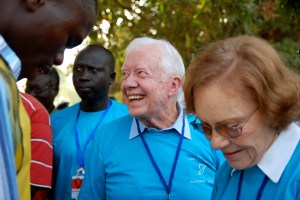
Image Credit: Alan Boswell/Tribune News Service/Getty Images Against the backdrop of a trip to Sudan, this 2011 in-depth profile of Carter attempts to make sense of the failure of his administration by sketching a glimpse of a serious-minded, plain-spoken politician with absolutely no patience for the politicking the office required. “I’m blown away by his intellectual command and his bluntness and his total lack of schmooze,” says one unnamed official in the piece by Nicholas Dawidoff. “Some guys are all form, no substance. He’s all substance, no form. Turns out each is bad.” Dawidoff’s warts-and-all piece attempts to place Carter’s complicated legacy in context, putting forth every single one of his weaknesses — his stinginess (a remnant of growing up during the Depression), his lack of charisma, his singleminded emphasis on facts rather than feelings — and paints a portrait of a deeply honest yet flawed man who was simply unable to effectively grease the wheels of the Washingtonian ass-kissing machine. — E.J.D.
-
Carter and Brokaw
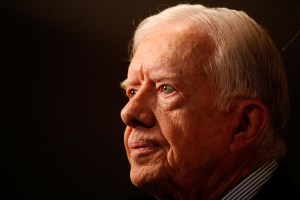
Image Credit: Phillip Cheung/Getty Images In this wide-ranging 2007 discussion with Tom Brokaw, Carter reflected on the changing times, chatting about the impact of the Vietnam War, his two iPods (which featured music from Bob Dylan, an early Carter favorite), the legacy of the baby boomer generation (“it may be economic catastrophe”) and hanging out with Willie Nelson, his old jogging buddy, while he was in the White House. “He never indicated an affinity for controlled substances when he was in the White House,” Carter told Brokaw, somewhat less than convincingly. — E.J.D.
-
Standing Against Conservatism
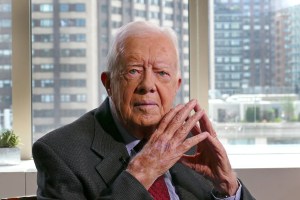
Image Credit: Ida Mae Astute/ABC/Getty Images Later in his life, Carter would become a strong voice for progressivism, frequently voicing his consternation in the press as the country grew more conservative. In 2015, he blasted the controversial Citizens United ruling, the 2014 Supreme Court decision eliminating caps on campaign donations, saying on The Thom Hartmann Program that the ruling was evidence of the country’s status as “an oligarchy with unlimited political bribery.” “We’ve just seen a complete subversion of our political system as a payoff to major contributors, who want and expect and sometimes get favors for themselves after the election’s over,” he said at the time. — EJD
-
The Ex-Presidents
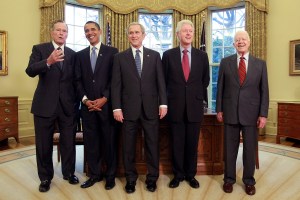
Image Credit: Mark Wilson/Getty Images Jimmy Carter remained diplomatic in the political sphere, despite moving on to more humanitarian efforts later in life. In 2017, Carter joined the then-four other living U.S. presidents — Barack Obama, George W. Bush, Bill Clinton, and George H.W. Bush (who died just over a year later) — who formed nonprofit One America Appeal to benefit recovery efforts for Hurricane Harvey (and also extended to benefit efforts with Irma and Maria). Then President Trump declined to unite with the former presidents in the endeavor, which raised more than $31 million and featured a performance by Lady Gaga. — A.L.
-
Speaking Out Against Efforts to Suppress the Vote
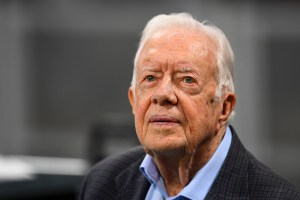
Image Credit: Scott Cunningham/Getty Images In October 2018, Jimmy Carter called for then-gubernatorial nominee and Georgia’s Secretary of State Brian Kemp to resign in the wake of Kemp’s voter suppression tactics. Among Kemp’s tyrannical moves, he suspended more than 53,000 voter applications, 70 percent of which were reportedly filed by Black residents. In a letter, Carter wrote that “popular confidence [in the election] is threatened not only by the undeniable racial discrimination of the past and the serious questions that the federal courts have raised about the security of Georgia’s voting machines, but also because you are now overseeing the election in which you are a candidate.” — A.L.
-
Jimmy Carter Speaks the Truth; Trump Goes on the Attack
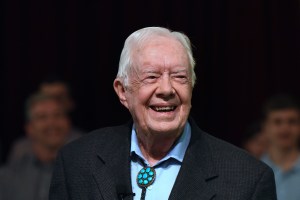
Image Credit: Paul Hennessy/NurPhoto/Getty Images In 2019, Jimmy Carter said what many of us had long believed. He was asked if Donald Trump was an “illegitimate president.” His answer was affirmative. “There’s no doubt that the Russians did interfere in the election, and I think the interference, although not yet quantified, if fully investigated, would show that Trump didn’t actually win the election in 2016. He lost the election, and he was put into office because the Russians interfered on his behalf.” Trump later went on to bash Carter, calling him “the forgotten president. And I understand why they say that. He was not a good president.” (In 2020, the Senate intelligence committee’s final report concluded that the Kremlin’s aim was “to harm the Clinton Campaign” and “help the Trump Campaign after Trump became the presumptive Republican nominee, and undermine the U.S. democratic process.”) — A.L.
-
How Jimmy Carter (Literally) Rocked the Presidency
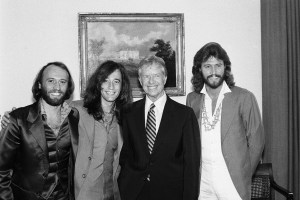
Image Credit: Bettmann Archive/Getty Images While his presidential term was brief and fraught with crises, Jimmy Carter’s legacy includes important in-roads, such as the Camp David accord between Egypt and Israel, the championing of human rights and solar power, and his pushback against the Soviet Union and Latin strongmen, as Rolling Stone’s David Browne notes. It’s also a legacy that recognized the significance of rock music and its surrounding culture. He quite literally rocked the presidency like none before him. He forged associations with artists including Bob Dylan, the Allmans, and the Band while he served as Georgia governor and he took those and other rock & roll relationships on the road and into the White House, paving the way for future Oval Office occupants to tap into the power of music on the campaign trail and beyond. — A.L.
